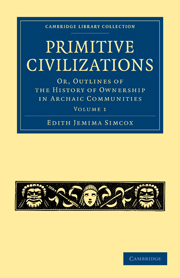Book contents
- Frontmatter
- PREFACE
- Contents
- CHAPTER 1 INTRODUCTION
- CHAPTER II PREHISTORIC PROBLEMS
- BOOK I OWNERSHIP IN EGYPT
- CHAPTER I THE MONARCHY AND THE ROYAL OFFICERS
- CHAPTER II THE ECONOMIC ORDER
- CHAPTER III COMMERCE AND INDUSTRY
- CHAPTER IV CASTE AND DESCENT
- CHAPTER V THE MILITARY CLASS
- CHAPTER VI THE NATIONAL RELIGION AND THE PRIESTHOOD
- CHAPTER VII CIVIL LAW AND CUSTOM
- CHAPTER VIII DOMESTIC RELATIONS AND FAMILY LAW
- BOOK II ANCIENT BABYLONIA
- BOOK III FROM MASSALIA TO MALABAR
CHAPTER VI - THE NATIONAL RELIGION AND THE PRIESTHOOD
Published online by Cambridge University Press: 07 September 2011
- Frontmatter
- PREFACE
- Contents
- CHAPTER 1 INTRODUCTION
- CHAPTER II PREHISTORIC PROBLEMS
- BOOK I OWNERSHIP IN EGYPT
- CHAPTER I THE MONARCHY AND THE ROYAL OFFICERS
- CHAPTER II THE ECONOMIC ORDER
- CHAPTER III COMMERCE AND INDUSTRY
- CHAPTER IV CASTE AND DESCENT
- CHAPTER V THE MILITARY CLASS
- CHAPTER VI THE NATIONAL RELIGION AND THE PRIESTHOOD
- CHAPTER VII CIVIL LAW AND CUSTOM
- CHAPTER VIII DOMESTIC RELATIONS AND FAMILY LAW
- BOOK II ANCIENT BABYLONIA
- BOOK III FROM MASSALIA TO MALABAR
Summary
THE WORSHIP OF ANIMALS AND NATURAL FORCES.
The caste theory of land tenure is more nearly accurate in what concerns the priesthood than the soldiery, but even in this case so many qualifications have to be made, that it seems scarcely worth while to choose such a term to describe the provision made for the Worship of the gods, the Commemoration of the dead, and the maintenance of the Priests. All authorities, from Herodotus to the Pentateuch, agree that the priests enjoyed some special privileges; but these did not always take the same form; and the earliest endowments or gifts of land for religious purposes concerning which we have authentic evidence, seem to appertain rather to tombs than temples, and are destined rather to secure the continued commemoration of the dead than the worship of the gods or the maintenance of the priests employed in such worship.
The religion of Egypt in the earliest ages was much less theological than afterwards. The primitive religion of Central Asia probably consisted of a kind of nature worship, associated with, or developing into, a worship of the “spirits” of real things. This is the religion of the Chinese Classics, and to this day no other belief is recognised as orthodox within the Middle Kingdom, where primitive rationalism still forms the religion of the learned. Under Semitic influence, the spirits worshipped by the ancient Babylonians on the one hand grew into or were superseded by gods, and on the other were degraded into symbols only used to conjure with.
- Type
- Chapter
- Information
- Primitive CivilizationsOr, Outlines of the History of Ownership in Archaic Communities, pp. 144 - 180Publisher: Cambridge University PressPrint publication year: 2010First published in: 1894



